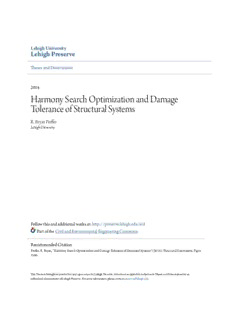Table Of ContentLehigh University
Lehigh Preserve
Theses and Dissertations
2014
Harmony Search Optimization and Damage
Tolerance of Structural Systems
R. Bryan Peiffer
Lehigh University
Follow this and additional works at:http://preserve.lehigh.edu/etd
Part of theCivil and Environmental Engineering Commons
Recommended Citation
Peiffer, R. Bryan, "Harmony Search Optimization and Damage Tolerance of Structural Systems" (2014).Theses and Dissertations.Paper
1586.
This Thesis is brought to you for free and open access by Lehigh Preserve. It has been accepted for inclusion in Theses and Dissertations by an
authorized administrator of Lehigh Preserve. For more information, please [email protected].
Harmony Search Optimization and Damage Tolerance of Structural Systems
by
R. Bryan Peiffer
A Thesis
Presented to the Graduate and Research Committee
of Lehigh University
in Candidacy for the Degree of
Master of Science
in
Structural Engineering
Department of Civil and Environmental Engineering
Lehigh University
Bethlehem, Pennsylvania
May, 2014
This thesis is accepted and approved in partial fulfillment of the requirements
for the Master of Science.
_______________________
Date
______________________
Thesis Advisor
______________________
Chairperson of Department
2
Acknowledgements
I would like to express my sincere appreciation to my thesis advisor, Dan M.
Frangopol, for his guidance and for the opportunity to work under him on this project. I
would also like to express my gratitude for his generosity and support from start to
finish. Also, thank you to my fellow student researchers especially Dr. Frangopol's
research group for their help throughout.
Finally, I would like to thank my family, Scott, Tracy and Bradley Peiffer for
their support and guidance in all my endeavors. I would also like to extend my heartiest
gratitude to my fiancée, Carrie Landis, for her encouragement and advice. This thesis
would not have been possible without her love and support.
The opinions, findings, and conclusions expressed in this thesis are those of the
author's and do not necessarily reflect the views of the individuals acknowledged above.
3
Table of Contents
ABSTRACT .............................................................................................................. 12
CHAPTER 1: INTRODUCTION ................................................................................... 14
1.1 GENERAL ........................................................................................................... 14
1.2 PROBLEM STATEMENT .......................................................................................... 16
1.3 OBJECTIVES ........................................................................................................ 16
1.4 METHODOLOGY .................................................................................................. 17
1.5 ORGANIZATION OF THESIS ...................................................................................... 17
CHAPTER 2: LITERATURE REVIEW ............................................................................ 18
2.1 INTRODUCTION ................................................................................................... 18
2.2 AISC-LRFD SPECIFICATION OF CONNECTIONS ............................................................. 18
2.2.1 TRUSS CONNECTIONS ................................................................................................. 18
2.2.2 SIMPLE CONNECTIONS ................................................................................................ 18
2.2.3 MOMENT CONNECTIONS ............................................................................................ 19
2.3 TYPES OF CONNECTIONS ........................................................................................ 20
2.3.1 SINGLE WEB ANGLE ...................................................................................................... 20
2.3.2 DOUBLE WEB ANGLE .................................................................................................... 21
2.3.3 HEADER PLATE ............................................................................................................ 21
2.3.4 TOP AND SEAT ANGLES ................................................................................................. 22
2.3.5 TOP AND SEAT ANGLES WITH DOUBLE WEB ANGLES............................................................. 22
4
2.3.6 EXTENDED END PLATE WITHOUT COLUMN STIFFENERS ......................................................... 23
2.3.7 EXTENDED END PLATE WITH COLUMN STIFFENERS .............................................................. 23
2.3.8 T-STUB ..................................................................................................................... 24
2.4 BEHAVIOR AND MODELING OF SEMI-RIGID CONNECTIONS ............................................... 24
2.5 MATHEMATICAL MODELING OF SEMI-RIGID CONNECTIONS .............................................. 26
2.5.1 LINEAR MODEL ......................................................................................................... 26
2.5.2 POLYNOMIAL MODEL ................................................................................................. 26
2.5.4 THREE-PARAMETER POWER MODEL .............................................................................. 29
2.6 OPTIMIZATION OF STEEL STRUCTURE ......................................................................... 29
2.7 HARMONY SEARCH ALGORITHM IN STRUCTURAL ENGINEERING ......................................... 32
2.8 UNCERTAINTY AND DAMAGE IN STRUCTURAL ENGINEERING ............................................. 32
2.10 CONCLUDING REMARKS ....................................................................................... 34
CHAPTER 3: OPTIMIZATION .................................................................................... 35
3.1 INTRODUCTION ................................................................................................... 35
3.2 HEURISTIC OPTIMIZATION TECHNIQUES ...................................................................... 36
3.2.1 GENETIC ALGORITHM (GA) ......................................................................................... 36
3.2.2 SIMULATED ANNEALING (SA) ...................................................................................... 37
3.2.3 ANT COLONY OPTIMIZATION ALGORITHM (ACO) ............................................................. 37
3.2.4 HARMONY SEARCH OPTIMIZATION ALGORITHM (HS) ........................................................ 38
3.3 BASIC OF HARMONY SEARCH ALGORITHM .................................................................. 38
5
3.4 HARMONY SEARCH OPTIMIZATION ALGORITHM IN STRUCTURAL ENGINEERING ..................... 38
3.4.1 INITIALIZE THE HARMONY SEARCH PARAMETERS ................................................................. 40
3.4.2 INITIALIZE HARMONY MEMORY ..................................................................................... 41
3.4.3 IMPROVISE A NEW HARMONY ...................................................................................... 41
3.4.4 UPDATE THE HARMONY MEMORY ................................................................................. 42
3.4.5 TERMINATION CRITERIA .............................................................................................. 42
3.5 COMPARISON BETWEEN HARMONY SEARCH AND OTHER OPTIMIZATION TECHNIQUES ............. 45
3.5.1 HARMONY SEARCH EXAMPLE: 10-BAR PLANAR TRUSS ...................................................... 45
3.6 DAMAGE TOLERANT OPTIMIZATION .......................................................................... 48
3.6.1 GENERAL MATHEMATICAL FORMULATION ...................................................................... 48
CHAPTER 4: STRUCTURAL RELIABILITY .................................................................... 51
4.1 INTRODUCTION ................................................................................................... 51
CHAPTER 5: MODELING OF STEEL STRUCTURES ....................................................... 55
5.1 INTRODUCTION ................................................................................................... 55
5.2 MATLAB ......................................................................................................... 55
5.2.1 MODELING OF TRUSS ................................................................................................. 57
5.2.2 MODELING OF FRAME ................................................................................................ 57
5.2.3 STIFFNESS METHOD FLOW CHART ................................................................................. 58
5.2.4 SOURCES OF NONLINEARITY ........................................................................................ 59
5.2.5 SEMI-RIGID CONNECTION NONLINEARITY ........................................................................ 59
6
5.2.6 GEOMETRIC NONLINEARITY ......................................................................................... 60
5.4 SAP2000 ......................................................................................................... 62
CHAPTER 6: DESIGN EXAMPLES .............................................................................. 65
6.1 DAMAGE TOLERANT TRUSS ..................................................................................... 65
6.1.2 SOLVING DAMAGE TOLERANT OPTIMIZATION PROBLEM ..................................................... 65
6.1.3 OPTIMIZATION RESULTS .............................................................................................. 67
6.2 FRAME OPTIMIZATION .......................................................................................... 72
6.2.2 FRAME DESIGN PARAMETERS ....................................................................................... 73
6.2.3 HARMONY SEARCH DESIGN PARAMETERS ....................................................................... 73
6.2.2 OBJECTIVE FUNCTION ................................................................................................. 75
6.2.3 UNCONSTRAINED OBJECTIVE PENALTY FUNCTION ............................................................. 75
6.2.4 CONSTRAINT VIOLATION FUNCTION FORMULA ................................................................. 75
6.2.5 DRIFT CONSTRAINTS ..................................................................................................... 76
6.2.6 SIZE CONSTRAINTS ....................................................................................................... 76
6.2.7 DEFLECTION CONSTRAINTS ............................................................................................ 76
6.2.8 STRENGTH CONSTRAINTS ............................................................................................... 77
6.2.8.1 COLUMN STRENGTH .................................................................................................. 78
6.2.9 RIGID FRAME RESULTS .................................................................................................. 80
6.3 DAMAGE TOLERANCE AND RELIABILITY ........................................................................ 83
6.3.1 EFFECTS OF DAMAGE ........................................................................................... 86
7
6.3.2 MEASURE OF REDUNDANCY ................................................................................... 88
CHAPTER 7: CONCLUSION ....................................................................................... 90
CHAPTER 8: RESEARCHER'S BIOGRAPHY ................................................................. 91
REFERENCES ........................................................................................................... 92
APPENDIX A - W-SHAPE SELECTION LIST ........................................................................... 97
APPENDIX B - HARMONY SEARCH SAMPLE FRAME MATLAB OPTIMIZATION CODE ................... 102
APPENDIX C - NONLINEAR STIFFNESS MATLAB CODE ........................................................ 106
8
Tables
Table 1 - Moment rotation curve fitting equations ......................................................... 28
Table 2 - Harmony search flow chart legend .................................................................. 43
Table 3 - 10 bar truss optimization comparison .............................................................. 47
Table 4 - Analysis comparison ....................................................................................... 64
Table 5 - Truss damage conditions ................................................................................. 68
Table 6 - Optimization comparison ................................................................................ 69
Table 7 - Truss results ..................................................................................................... 71
Table 8 - Rigid frame results .......................................................................................... 80
Table 9 - Semi-rigid frame results .................................................................................. 81
Table 10 - Frame optimization comparison .................................................................... 81
Table 11 - 5 bar optimization results .............................................................................. 83
Table 12 - Random variables .......................................................................................... 83
9
Description:2.2 AISC-LRFD SPECIFICATION OF CONNECTIONS . In its most simplistic form, a structure is "any assemblage of materials which is intended to

